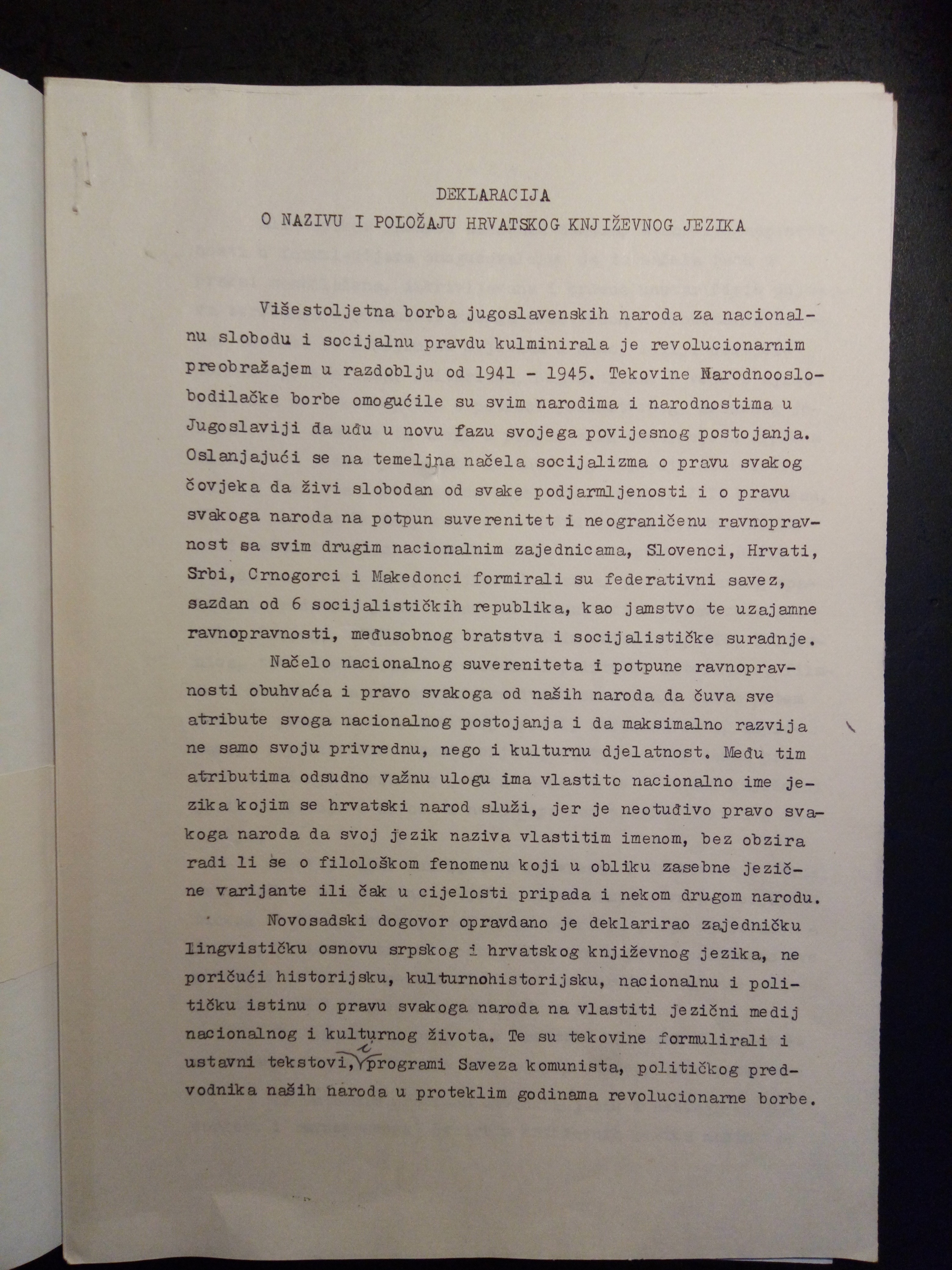The Declaration on the Name and Status of the Croatian Literary Language was proclaimed by Croatian linguists published in the weekly Telegram on March 17, 1967, with the signatures of eighteen Croatian scholarly and cultural institutions. Croatian linguists and writers gathered around Matica hrvatska and the Association of Writers of Croatia were dissatisfied with published dictionaries and orthographies in which the language, according to the Novi Sad Agreement (1954), was called Serbo-Croatian. In late 1966 and early 1967, they had decided to write an amendment to the new Constitution which was being prepared in the late 1960s. They secretly prepared a text about the name and status of the language that was officially used in the Socialist Republic of Croatia (SRH) as part of the then Socialist Federal Republic of Yugoslavia (SFRY). The text of the Declaration was drafted in Matica hrvatska's premises by a group of academics, literary and cultural workers (Miroslav Brandt, Dalibor Brozović, Radoslav Katičić, Tomislav Ladan, Slavko Mihalić, Slavko Pavešić, Vlatko Pavletić). The Steering Committee of Matica hrvatska approved the content of the Declaration on March 13, 1967, and sent it to other Croatian cultural and academic institutions. In the next few days, the Declaration was signed by a total of eighteen Croatian academic and cultural institutions which directly dealt with the Croatian language, and by a significant number of prominent intellectuals.
The publication of the Declaration was not only a cultural but also a political affair. It had additional weight because of Miroslav Krleža, probably the most prominent left-wing intellectual not only in Croatia but all of Yugoslavia, was one of the intellectuals who signed the document. Despite the fact that the writers of the Declaration were cautious in attempting to avoid any boundaries set by the League of Communists (they used the usual communist phraseology and the style of "self-managing socialism" and the Yugoslav slogan of "fraternity and unity"), the publication of the Declaration triggered strong political reactions and set the repressive apparatus in motion. The Croatian language was a litmus test through which the overall economic, political and cultural subordination of Croatia within Yugoslavia was revealed (Kovačec 2017), and the appearance of the Declaration is considered the practical beginning of the Croatian national movement – the Croatian Spring.
The Matica hrvatska Collection at the Croatian State Archives contains the original document of the Declaration with accompanying materials (the manuscript of the Declaration, multiple typescript versions with and without signatures and stamps, Dalibor Brozović's telegrams, letters of the signatory institutions of the Declaration that give their support to its contents).
viidete nimekiri
Bratulić, Josip (ed.). 1997. Matica hrvatska: 1842. - 1997. (Matica hrvatska: 1842-1997). Zagreb: Matica hrvatska.
Bućin, Rajka. 1998. Matica hrvatska: sumarni inventar (Matica hrvatska: summary inventory). Zagreb: Croatian State Archives.
“Deklaracija o nazvu i položaju hrvatskog književnog jezika“ (“Declaration on the Name and Position of the Croatian Literary Language“). Matica hrvatska. Accessed 20 August, 2018.
Hekman, Jelena. 2002. Izvještaj o kontroli zakonitosti rada Matice hrvatske (Report on controlling the legality of the work of Matica hrvatska). Zagreb: Matica Hrvatska.
Jelčić, Dubravko. 1992. „Sto pedeset godina Matice hrvatske“ (The Hundred and Fifty Years of Matica Hrvatska“). Radovi Leksikografskoga zavoda 'Miroslav Krleža', 2 (1992): 81-96.
Kovačec, August. 2017. „Deklaracija o nazivu i položaju hrvatskoga jezika u povijesnom kontekstu“ (“Declaration on the Name and Position of the Croatian Language in Historcal Context“). Hrvatska revija 1 (2017). Matica hrvatska. Accessed October 4, 2018.
Samardžija, Marko (ed.). 2017. Deklaracija o nazivu i položaju hrvatskog književnog jezika 1967.-2017.: vijesti, komentari, osude, zaključci (Declaration on the Name and Position of the Croatian Literary Language 1967-2017: news, comments, judgements, conclusions). Zagreb: Matica hrvatska.
Štambuk-Škalić, Marina. 2009. „Arhivsko gradivo o Matici hrvatskoj u fondovima Hrvatskog državnog arhiva“ („Archival records on Matica hrvatska in the funds of the Croatian State Archives“). Kolo 1-2 (2009). Matica hrvatska, Accessed October 4, 2018.
Zidić, Igor (ed.). 2017. Hrvatska i Hrvatsko proljeće 1971. Zbornik radova (Croatia and the Croatian Spring 1971: proceedings ). Zagreb: Matica hrvatska.
Fabekovac, Mario, interview by Mihaljević, Josip, October 02, 2018. COURAGE Registry Oral History Collection

